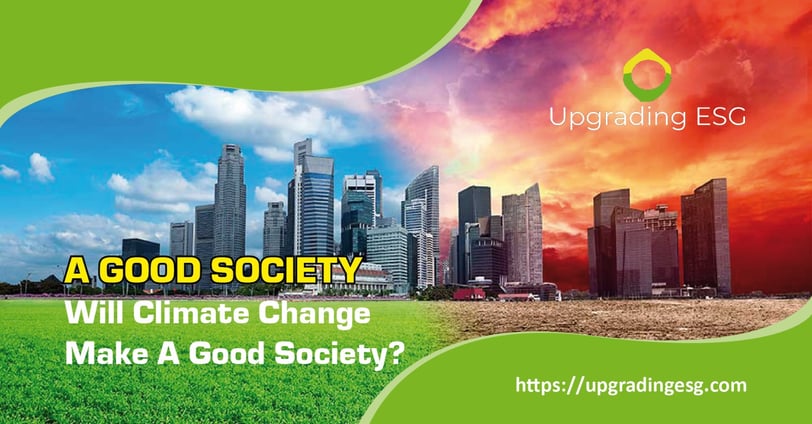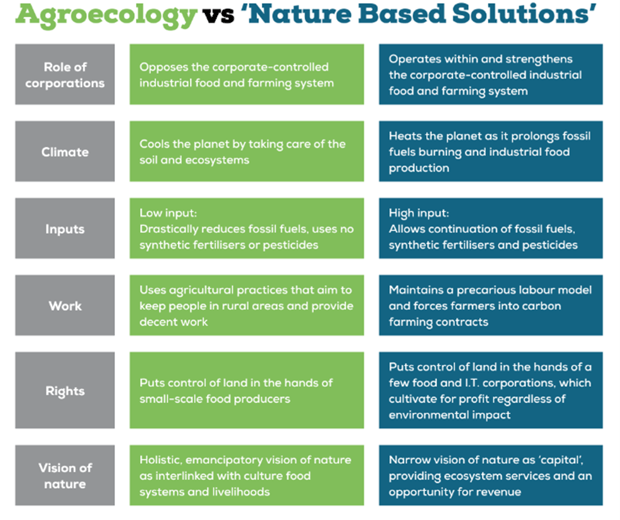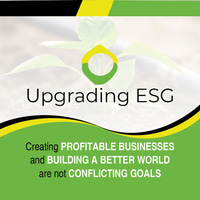A good Society


In this blog, we explore and learn about what makes a “Good Society”. We will explore this concept and again ask whether climate change makes a good society. I will briefly touch on CSR– Corporate Social Responsibility and look into an example of why our current term of investing in NBS – Nature-based systems is flawed.
A good society does not just happen, nor is it created by the market or state. It is made up of our moral choices of each of us. We can choose to do good or do nothing. Through our actions, we can make a difference. Through our collective actions, we can make a good society.
A good society is committed to improving the lives of its people. This means working together to achieve the UN Sustainable Development Goals (SDGs), a set of 17 goals adopted by all UN member states in 2015. The SDGs are a call to action to end poverty, protect the planet, and ensure prosperity for all. They are a roadmap for creating a better future for everyone.
Definition of a Good Society
I got the inspiration for this title from Rabbi Jonathan Sacks, a leading rabbi and philosopher who wrote extensively on the topic of the good society. He argued that a good society is based on the following principles:
Morality: The good society is a moral society where people are treated with dignity and respect, regardless of their race, religion, or social status.
Justice: The good society is a just society where everyone has the opportunity to succeed, regardless of their background.
Compassion: The good society is compassionate, where people care for the weak and vulnerable.
Tolerance: A good society is tolerant, where people respect different cultures and beliefs.
Sustainability: The good society is sustainable, where we live in harmony with the environment.
Rabbi Sacks believed that these principles are not just ideals but they are essential for creating a better world. He argued that a good society is not something that happens by accident but it is something that we have to work for. He called on individuals, communities, and nations to commit themselves to creating a good society for all.
Here are some specific examples of how Rabbi Sacks' teaching on the good society can be applied in the real world:
We can create a more moral society by fighting against racism, sexism, and other forms of discrimination.
We can create a more just society by ensuring that everyone has access to quality education, healthcare, and housing.
We can create a more compassionate society by volunteering our time to help those in need.
We can create a more tolerant society by learning about different cultures and religions and respecting their beliefs.
We can create a more sustainable society by reducing our consumption of resources and investing in renewable energy.
Rabbi Sacks' teaching on the good society is a powerful reminder that we all have a role to play in creating a better world.
Working together can build a more moral, just, compassionate, tolerant, and sustainable society.
How does this fit into the S - Social of ESG?
For this, we can look at the definition of
Corporate social responsibility (CSR) is a concept whereby companies integrate social and environmental concerns into their business operations and interactions with their stakeholders. CSR is important for a number of reasons. It can help companies improve their reputation, reduce their risk, create a competitive advantage, and positively impact the world. There are a number of different ways to measure CSR, some common metrics include environmental impact, community impact, labour practices, and human rights. CSR is a complex and evolving concept, but it is an important concept that can help companies be more successful and positively impact the world.
I will further expand on this in next week’s blog, where I will look at CSR in more detail, focusing on CSR in Africa – The potential for a fairer and more sustainable world.
The rights of citizens
Something really amazing happened this week. For the first time in U.S. history, a court found that a state’s law promoting the use of fossil fuels — while ignoring their climate impacts — violates the state’s constitution. The court ruling stated, “Plaintiffs have a fundamental constitutional right to a clean and healthful environment, which includes climate as part of the environmental life-support system.”
This is an exciting development. Unfortunately, Government does always put the rights of its citizens first, and big conglomerates have unfair advantages.
So, in seeking a good society, the court has a vital role to play.
This ruling opens up a major new concern. It is easy for Montana and other states to pretend they are reducing GHG emissions by promoting “greenwashing” technologies that may market a “clean” spin on a product that doesn’t actually cut emissions. Advocates of such technologies allege they reduce CO2 but, on closer inspection, the technologies instead increase it along with air pollution, fossil mining and fossil infrastructure.
The conflict of terminology leading to greenwashing
I was alerted to the difference between ‘agroecology; vs ‘nature based solutions’ (NBS) by Ugo Micoli on LinkedIn. I think this highlights a contradiction that we in carrying CSR, or sustainable Investing.
https://www.linkedin.com/in/ugomicoli
He writes:
Since 2020, there has been a growing tendency to present agroecology as compatible with, or as a subset of, ‘nature-based solutions’ (NBS).
For example, the 2021 UN Food Systems Summit considered agroecology as one possible category of NBS.
"Agribusiness and fossil fuel corporations, corporate platforms such as the World Economic Forum and the finance industry are heavily promoting NBS...
For them, this is a ‘win-win-win’. They are co-opting and undermining agroecology for food sovereignty... They tend to focus on agriculture's carbon reduction or sequestration potential as a primary indicator of sustainability and ignore agroecology's wider ecological, social, and economic justice elements.
"This allows them to promote a certain type of regenerative agriculture... promoting a few agricultural practices – no-till farming, fertiliser management, cover cropping and the use of corporate digital technologies – rather than systemic change.
"These practices [maintain] industrial agriculture and corporate control of farming. For example, no-till farming is widely used by the pesticide and biotech industry to promote their products.
"Agribusinesses view NBS as a potential new income stream, which allows them to appear green, as they carry on with the usual destructive farming business models.
"The finance sector is also keen to grow NBS as a new asset class for financial speculation. The value of voluntary carbon markets quadrupled between 2020 and 2021, driven in part by the acceleration of NBS projects.
"The UN FAO ‘Agriculture NBS’ (Ag-NBS) initiative, in partnership with The Nature Conservancy, markets [NBS] to financial investors who are keen on taking control of ‘natural capital’ and physical assets such as land and forests to shore up their green credentials.
"This conflating of the two approaches sits uncomfortably with the history of NBS as a tool for funding ‘protected areas’ run by the global conservation industry, a history with significant evidence of displacement and conflict with local communities. This history has been at odds with the call for agrarian reform and land redistribution that are core to many agroecological movements, especially in the global South.
"The incompatibilities have become even more pronounced as NBS has become a tool to provide carbon credits for fossil fuel corporations, agribusinesses and governments that prefer the distractions of ‘net zero’ over real zero emissions targets.
"Despite the nice imagery, these so-called solutions will integrate the carbon storage capacity of nature into corporate profit chains and turn nature and carbon into financial assets."
The above highlighted Screenshot from the Friends of the Earth International factsheet.
in this blog. I have tried to paint a picture of a Good Society leading to CSR and hopefully to investment into areas that can make a difference such agroecology.
Call of action
· Upgrading ESG for a fairer and more sustainable world.
· Creating profitable businesses and building a better world are not conflicting goals.
· Are you ready to upgrade your business?
· Get in touch to find out how?
Time for your business to make a difference – Stand up and be noticed
Upgrading ESG focuses on upgrading your business for profit and Impact.
We are advocating that Corporate Social Responsibility (CSR) is the first step in your ESG journey.
We advocate Agro Offsets (instead of Carbon offsets) in Agro-Ecology in Developing Countries.
We are part of the global village marketplace. This includes developing countries which is a blue ocean investment opportunity.
This holds the best chance of a fairer and more sustainable world.
For CEOs, for CFOs and Directors
Upgrading ESG requires a comprehensive approach integrating sustainable practices, policy changes, technological innovation, and collective action. We can restore and protect the world by working together across sectors and taking action at various levels.
I have chosen to keep the words ESG – This represents the best chance for the Environment and Society. Without Governance – Structure, processes, reporting and transparency, we will continue to greenwash and be hoodwinked. ESG is much more than Investing ESG or Company ESG, but we need to have Country ESG, City ESG and Product ESG where we, the consumer and citizen, know the good and bad of that product for the environment and society.
Hence, the need to Upgrade ESG.
ESG represents a substantial shift in how companies and boards operate their businesses and impact the world for the better. This is cemented by the IFRS’s new sustainability standards, which require a much more comprehensive, documented approach that will drive the need for ESG compliance and assurance. Ultimately, it will affect Investors and positively or negatively on the company's ability to keep or gain new customers.
Companies and boards must take urgent action in this new ESG world.
Upgrading ESG provides an opportunity for your company to upgrade your ESG story.
Please reach out to me.
I invite you to learn how we can help you in your sustainability journey.
Please feel free to reach out to me by email: Jeffrey@upgradingESG.com.
Or browse my blogs on https://www.upgradingESG.com
Join 20,000 + people on the LinkedIn Upgrading ESG group sharing ideas and news https://www.linkedin.com/groups/133378.
Subscribe to my substack channel. https://upgradingesg.substack.com/
With thanks and blessings
Jeffrey Levine


